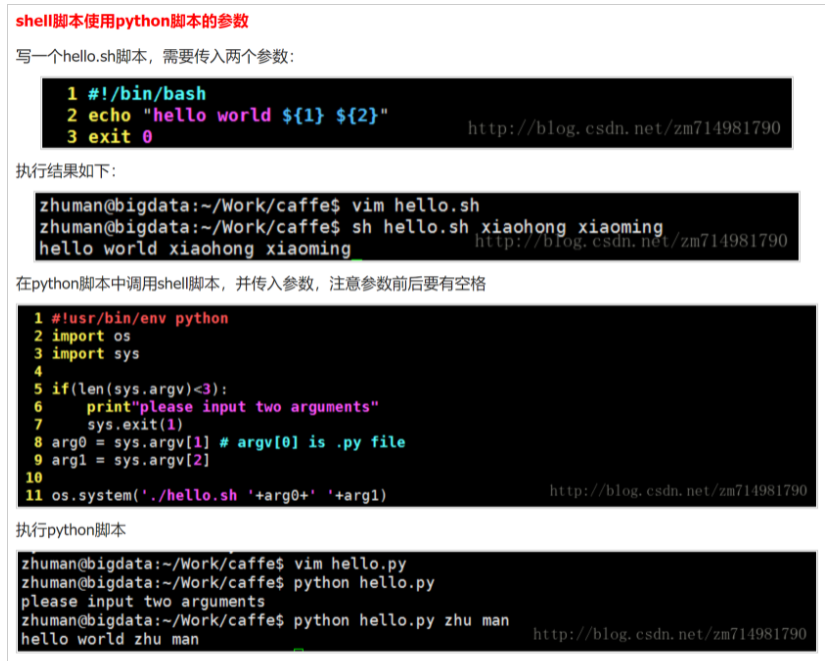python调用bash shell脚本
maxwell-ma 人气:01. os.system()
help(os.system)
1.1. demo
os.system(command):该方法在调用完shell脚本后,返回一个16位的二进制数,- 低位为杀死所调用脚本的信号号码,高位为脚本的退出状态码,
- 即脚本中exit 1的代码执行后,
os.system函数返回值的高位数则是1,如果低位数是0的情况下, - 则函数的返回值是0x0100,换算为十进制得到256。
- 要获得
os.system的正确返回值,可以使用位移运算(将返回值右移8位)还原返回值:
>>> import os
>>> os.system("./test.sh")
hello python!
hello world!
256
>>> n>>8
1
2. os.popen()
help(os.system)
2.1 demo
os.popen(command):这种调用方式是通过管道的方式来实现,函数返回一个file对象,
里面的内容是脚本输出的内容(可简单理解为echo输出的内容),使用os.popen调用test.sh的情况
>> import os
>>> os.popen("./test.sh")
<open file './test.sh', mode 'r' at 0x7f6cbbbee4b0>
>>> f=os.popen("./test.sh")
>>> f
<open file './test.sh', mode 'r' at 0x7f6cbbbee540>
>>> f.readlines()
['hello python!\n', 'hello world!\n']
3. commands模块
- (1)commands.getstatusoutput(cmd),其以字符串的形式返回的是输出结果和状态码,即(status,output)。
- (2)commands.getoutput(cmd),返回cmd的输出结果。
- (3)commands.getstatus(file),返回ls -l file的执行结果字符串,调用了
getoutput,不建议使用此方法
4. subprocess
subprocess模块,允许创建很多子进程,创建的时候能指定子进程和子进程的输入、输出、错误输出管道,执行后能获取输出结果和执行状态。
- (1)subprocess.run():python3.5中新增的函数, 执行指定的命令, 等待命令执行完成后返回一个包含执行结果的CompletedProcess类的实例。
- (2)subprocess.call():执行指定的命令, 返回命令执行状态, 功能类似os.system(cmd)。
- (3)subprocess.check_call():python2.5中新增的函数, 执行指定的命令, 如果执行成功则返回状态码, 否则抛出异常。
说明:subprocess.run(args, *, stdin=None, input=None, stdout=None, stderr=None, shell=False, timeout=None, check=False, universal_newlines=False)
subprocess.call(args, *, stdin=None, stdout=None, stderr=None, shell=False, timeout=None)
subprocess.check_call(args, *, stdin=None, stdout=None, stderr=None, shell=False, timeout=None)
args:表示shell指令,若以字符串形式给出shell指令,如"ls -l “则需要使shell = Ture。否则默认已数组形式表示shell变量,如"ls”,"-l"。
当使用比较复杂的shell语句时,可以先使用shlex模块的shlex.split()方法来帮助格式化命令,然后在传递给run()方法或Popen。
4.1 demo
Stubs for subprocess
Based on http://docs.python.org/2/library/subprocess.html and Python 3 stub
from typing import Sequence, Any, Mapping, Callable, Tuple, IO, Union, Optional, List, Text
_FILE = Union[None, int, IO[Any]]
_TXT = Union[bytes, Text]
_CMD = Union[_TXT, Sequence[_TXT]]
_ENV = Union[Mapping[bytes, _TXT], Mapping[Text, _TXT]]
# Same args as Popen.__init__
def call(args: _CMD,
bufsize: int = ...,
executable: _TXT = ...,
stdin: _FILE = ...,
stdout: _FILE = ...,
stderr: _FILE = ...,
preexec_fn: Callable[[], Any] = ...,
close_fds: bool = ...,
shell: bool = ...,
cwd: _TXT = ...,
env: _ENV = ...,
universal_newlines: bool = ...,
startupinfo: Any = ...,
creationflags: int = ...) -> int: ...
def check_call(args: _CMD,
bufsize: int = ...,
executable: _TXT = ...,
stdin: _FILE = ...,
stdout: _FILE = ...,
stderr: _FILE = ...,
preexec_fn: Callable[[], Any] = ...,
close_fds: bool = ...,
shell: bool = ...,
cwd: _TXT = ...,
env: _ENV = ...,
universal_newlines: bool = ...,
startupinfo: Any = ...,
creationflags: int = ...) -> int: ...
# Same args as Popen.__init__ except for stdout
def check_output(args: _CMD,
bufsize: int = ...,
executable: _TXT = ...,
stdin: _FILE = ...,
stderr: _FILE = ...,
preexec_fn: Callable[[], Any] = ...,
close_fds: bool = ...,
shell: bool = ...,
cwd: _TXT = ...,
env: _ENV = ...,
universal_newlines: bool = ...,
startupinfo: Any = ...,
creationflags: int = ...) -> bytes: ...
PIPE = ... # type: int
STDOUT = ... # type: int
class CalledProcessError(Exception):
returncode = 0
# morally: _CMD
cmd = ... # type: Any
# morally: Optional[bytes]
output = ... # type: Any
def __init__(self,
returncode: int,
cmd: _CMD,
output: Optional[bytes] = ...) -> None: ...
class Popen:
stdin = ... # type: Optional[IO[Any]]
stdout = ... # type: Optional[IO[Any]]
stderr = ... # type: Optional[IO[Any]]
pid = 0
returncode = 0
def __init__(self,
args: _CMD,
bufsize: int = ...,
executable: Optional[_TXT] = ...,
stdin: Optional[_FILE] = ...,
stdout: Optional[_FILE] = ...,
stderr: Optional[_FILE] = ...,
preexec_fn: Optional[Callable[[], Any]] = ...,
close_fds: bool = ...,
shell: bool = ...,
cwd: Optional[_TXT] = ...,
env: Optional[_ENV] = ...,
universal_newlines: bool = ...,
startupinfo: Optional[Any] = ...,
creationflags: int = ...) -> None: ...
def poll(self) -> int: ...
def wait(self) -> int: ...
# morally: -> Tuple[Optional[bytes], Optional[bytes]]
def communicate(self, input: Optional[_TXT] = ...) -> Tuple[Any, Any]: ...
def send_signal(self, signal: int) -> None: ...
def terminate(self) -> None: ...
def kill(self) -> None: ...
def __enter__(self) -> 'Popen': ...
def __exit__(self, type, value, traceback) -> bool: ...
# Windows-only: STARTUPINFO etc.
STD_INPUT_HANDLE = ... # type: Any
STD_OUTPUT_HANDLE = ... # type: Any
STD_ERROR_HANDLE = ... # type: Any
SW_HIDE = ... # type: Any
STARTF_USESTDHANDLES = ... # type: Any
STARTF_USESHOWWINDOW = ... # type: Any
CREATE_NEW_CONSOLE = ... # type: Any
CREATE_NEW_PROCESS_GROUP = ... # type: Any

加载全部内容